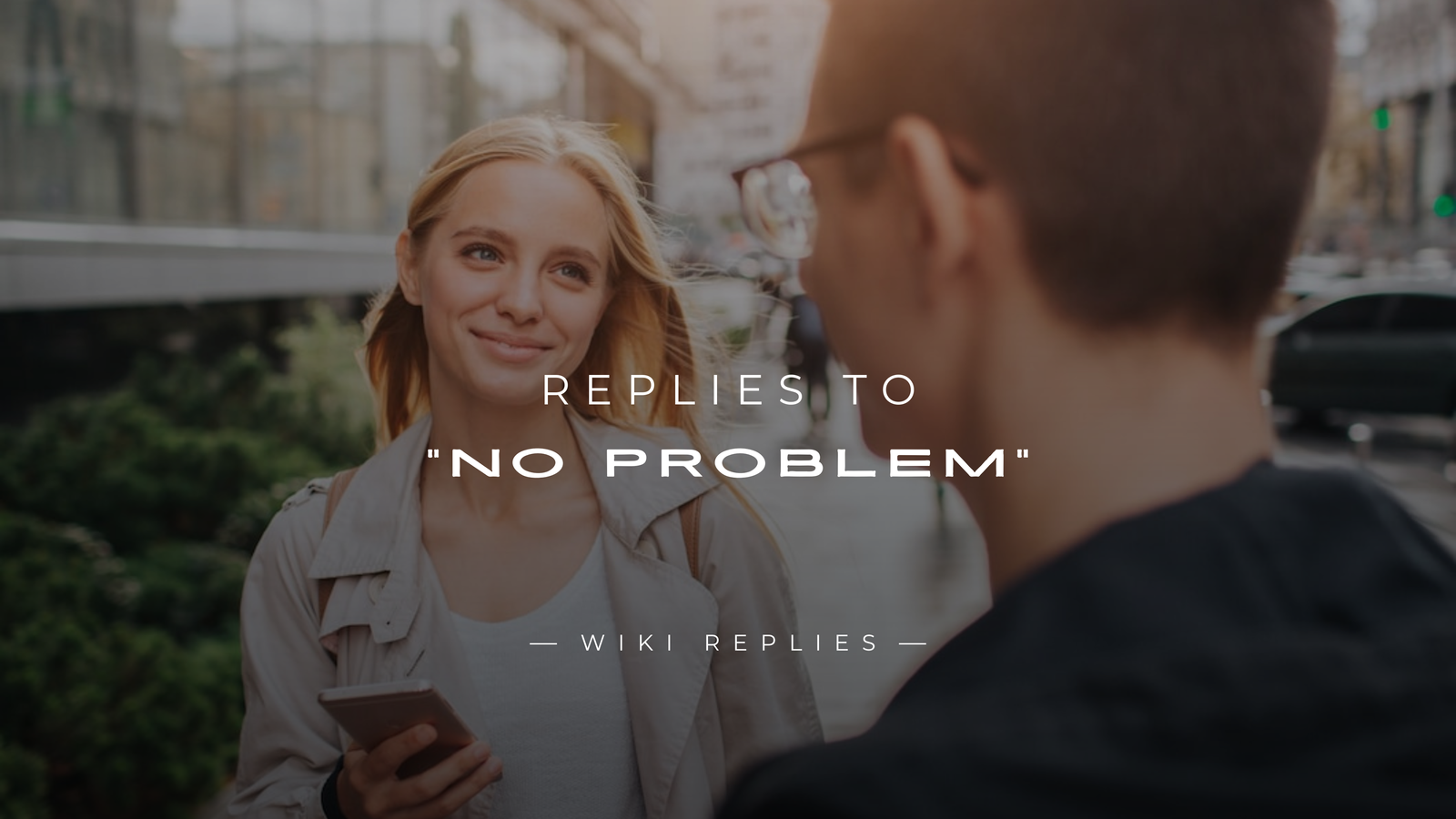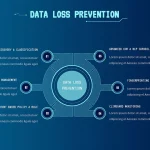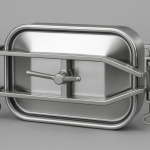If you’ve ever thanked someone and heard them casually respond with “No problem,” you might have paused for a moment, wondering what to say next. It’s a common scenario that plays out in both in-person conversations and digital interactions every single day. While the phrase “No problem” might seem straightforward, it can sometimes feel ambiguous, especially when you’re unsure how to respond politely and naturally.
In this comprehensive guide, we’ll explore what “No problem” really means, when and why people say it, and most importantly, how you can respond in a way that feels confident, appropriate, and genuine in any situation. Whether you’re dealing with a quick chat between friends, a customer service exchange, or a formal business interaction, knowing how to reply to “No problem” can help you communicate more effectively and leave a positive impression.

250+ Replies to “No Problem” In A Text Or In Person
Acknowledgment
- Gotcha, thanks!
- Alright, sounds good.
- Cool, just checking.
- Okay then, all set.
- Makes sense, thanks.
- Noted, appreciate it.
- Copy that.
- All good on my end too.
- Roger that.
- Understood, thank you.
Gratitude
- Thank you, seriously.
- Really appreciate that.
- Means a lot, thanks again.
- Couldn’t have done it without you.
- That helped me more than you know.
- You saved me some stress there.
- I owe you one!
- Thanks for being awesome.
- Truly grateful, thank you.
- Appreciate you taking the time.
Friendly/Polite
- You’re always so helpful!
- Thanks again, you’re the best.
- Appreciate you, as always.
- You’re a real one!
- Kind of you to say that.
- Always nice chatting with you.
- Thanks! You’ve got great vibes.
- Appreciate your kindness.
- That was thoughtful, thank you.
- You’re too kind.
Casual/Chill
- Sweet, thanks!
- Nice, love it.
- Cool cool, appreciate it.
- No sweat, right?
- We’re good then.
- Chill, thanks dude.
- Works for me.
- Aight, sounds good.
- Solid, all set.
- Dope, thanks!
Humorous
- Good, because if it was a problem, we’d be fighting.
- I was about to panic, so thanks!
- You’re too chill, it’s intimidating.
- Look at you being all helpful and stuff.
- Cool cool, no FBI needed.
- Alright then, back to being legends.
- You sure? I was expecting drama.
- Problem-free zone confirmed.
- Can I quote you on that in court?
- Dang, you’re efficient.
Affectionate/Personal
- You’re seriously the best.
- Love you for that.
- You always got my back.
- You’re my favorite human.
- Thanks babe, appreciate you.
- You came through like always.
- I don’t say it enough, but thank you.
- That’s why I adore you.
- You make life easier, for real.
- You’re a gem.
Reciprocal Help
- Let me know if I can help you sometime.
- You got me today, I got you next time.
- I owe you one big time.
- Seriously, hit me up if you need anything.
- I’ve got your back too.
- Anytime you need me, just say so.
- That means a lot, and I’m here for you too.
- Appreciate it, and I’m just a text away.
- Let me return the favor soon.
- I’ll remember that for next time.
Professional/Formal
- Thank you, much appreciated.
- Understood. I’ll move forward accordingly.
- Thank you for your assistance.
- Appreciate your support on this.
- Thanks again for clarifying.
- That’s noted, thank you.
- I’ll proceed as discussed.
- Thank you for the timely response.
- Acknowledged with thanks.
- I appreciate your professionalism.
Follow-up Question
- Thanks! Quick thing though…
- Got it, and just wondering do you mind if I ask one more thing?
- Awesome. By the way, do you know if…
- Appreciate that. Can I follow up with another question?
- Great, and while I have you, I was wondering…
- Perfect. Also, have you heard anything about…
- Thanks! Just curious, what would you do in XYZ situation?
- Makes sense. Can I ask something else real quick?
- Appreciate it. And hey, do you happen to know…
- That helps a lot. Mind if I check one more detail with you?
Reflective
- I really didn’t want to bother you, so I’m glad it worked out.
- I was a bit worried about asking, so thank you.
- That actually means more to me than you probably realize.
- I’m learning it’s okay to ask for help sometimes.
- Honestly, I thought it might be a bigger deal. Appreciate the ease.
- I’ve been overthinking this, so your calm response helped.
- It’s nice when things go smoothly like this.
- I expected stress, but you handled it like a pro.
- Thanks for being easygoing, it really makes a difference.
- That response reminded me that not everything has to be complicated.
Sarcastic or Teasing
- Oh wow, what a hero.
- Look at you being all calm and collected.
- You make it sound like I didn’t beg.
- Wow, such generosity.
- I’ll just engrave your kindness in stone.
- Is this your superhero moment?
- So selfless, how ever will I repay you?
- You say “no problem” like I didn’t just stress over it.
- I’ll alert the media to your noble act.
- And here I was planning to write you a thank-you speech.
Relief
- Oh good, I was honestly stressing.
- That’s a weight off my shoulders.
- Phew, I wasn’t sure how that would go.
- I’m so glad to hear that.
- Was worried for a sec, but awesome.
- Big sigh of relief right now.
- That’s one less thing to worry about.
- Happy to hear it wasn’t a hassle.
- That makes me feel so much better.
- You just made my day easier, thank you.
Celebratory
- Yay! Appreciate you!
- Woohoo, thanks a ton.
- That’s what I’m talking about!
- You rock!
- Look at us, problem-solving like champs.
- Cheers to that!
- We love a smooth process.
- Gold star for you.
- That’s a win in my book.
- Victory dance unlocked!
Time-Sensitive
- Thanks for handling that so quickly.
- Appreciate the fast response.
- Really glad you were available right away.
- You saved me a lot of time.
- Thanks for the quick turnaround!
- Timing was perfect, honestly.
- I needed that fast and you delivered.
- Appreciate you jumping on it so fast.
- That was super efficient, thank you.
- Seriously, your speed helped a ton.
Clarification
- So just to be sure, we’re all good?
- You mean it’s totally fine, right?
- Just double-checking, no issues at all?
- It’s really okay? I didn’t mess anything up?
- No hidden problems I should know about?
- Just making sure I didn’t overlook anything.
- Want to confirm everything’s still on track.
- Can you confirm one last thing?
- Nothing I need to fix or follow up on?
- Thanks, and just to clarify, we’re good moving forward?
Instructional
- Okay, I’ll go ahead then.
- Got it, I’ll take care of it now.
- Alright, I’ll proceed as planned.
- Cool, moving forward with it.
- I’ll take that as a green light.
- Alright, I’ll finish it up on my end.
- Sounds good, I’ll update the rest.
- Perfect, I’ll let the others know.
- Copy that, I’ll handle it.
- Alright, I’m on it now.
Neutral/Minimal
- Okay.
- Got it.
- Alright.
- Cool.
- Thanks.
- Sure.
- Noted.
- Yup.
- Good.
- Right.
Role-Based
- Thanks, boss. Appreciate the quick help.
- You’re always on top of things, coach.
- Appreciate it, doc. You made that easy.
- Thanks, captain. You’re the real MVP.
- You’re a legend, professor.
- Thanks, partner. Smooth as always.
- Appreciate that, manager. I’ll keep it moving.
- As always, you deliver. Thanks, chief.
- Thanks, team lead. All clear on my end.
- Appreciate it, friend. You’ve always got me.
Reassurance
- Glad it really wasn’t a big deal.
- Good to know I didn’t cause a mess.
- Appreciate you saying that, I was worried.
- Okay, cool. I just didn’t want to step on any toes.
- I thought it might be annoying, so thanks.
- That makes me feel a bit better, honestly.
- Whew, thanks for not making it weird.
- Wasn’t sure how you’d take it, so that’s a relief.
- Appreciate the patience, I overthink this stuff.
- I always try to be mindful, so I’m glad it’s okay.
Gratitude + Humor
- You deserve a gold star for that.
- Thanks! I’ll name my next pet after you.
- Appreciate it. You’re on my holiday gift list now.
- I owe you coffee, snacks, and eternal loyalty.
- You get five cool points today.
- You saved the day and probably my sanity.
- I was gonna panic but you just canceled that.
- Thank you. I’ll try not to mess it up next time.
- I’d write a thank-you poem but I’ll spare you.
- Honestly, you’re too cool. It’s getting suspicious.
Nonverbal (In Person)
- Thumbs up with a smile
- Nods in appreciation
- Friendly salute
- Hand over heart with a grin
- Double thumbs up
- Small bow and smile
- Quick high five
- Warm eye contact and a head nod
- Winks and gives a fist bump
- Raises eyebrows with a grateful expression
Emphasizing Helpfulness
- That genuinely helped me out.
- I needed that more than you know.
- You made that way easier for me.
- You’re seriously a big help, every time.
- I appreciate how smooth you made that.
- That saved me a headache, honestly.
- I was stuck, and you came through.
- You have no idea how much that meant.
- I’d be scrambling without your help.
- I’m always better off when you step in.
Repetition
- No problem? Good. Then we’re even.
- That’s what I like to hear.
- No problem, no stress, all good.
- Alright then, no problem it is.
- Just making sure it really is no problem.
- No problem now, no problem later.
- Good to hear. I’ll hold you to that.
- Music to my ears.
- Love that answer.
- Cool cool, no problem noted.
Future Reference
- I’ll remember that for next time.
- Appreciate it. You’re on my go-to list now.
- Good to know for the future.
- I’ll keep that in mind moving forward.
- Noted for next time we run into this.
- I’ll hit you up again if it comes up.
- You just earned future questions from me.
- That makes future things easier too.
- This will definitely help going forward.
- I’ll circle back to you when needed again.
Compliment
- You’re seriously amazing.
- You always make things easier.
- That’s why everyone loves working with you.
- You’ve got such a calming way about you.
- You’re such a natural at this.
- You always come through without stress.
- You’re just too good at what you do.
- You’ve got the magic touch.
- You’re the real MVP.
- People like you make life better.
What Does “No Problem” Really Mean in Conversation?
The phrase “No problem” is commonly used as a response to someone’s expression of gratitude. It essentially conveys that whatever action the speaker performed was not an inconvenience and that they were happy to help. It’s often used in place of more traditional phrases like “You’re welcome.”
Unlike “You’re welcome,” which emphasizes the act of receiving thanks, “No problem” focuses on reassuring the person that their request or need did not cause trouble. It’s an indirect way of saying, “Don’t worry about it,” or “It was nothing.”
Why Do People Say “No Problem” Instead of “You’re Welcome”?
Understanding the psychology and culture behind language choices helps us respond better. Here are a few reasons people may prefer “No problem” over traditional expressions of politeness.
- Informality and Friendliness
Modern speech trends lean toward relaxed and approachable communication. “No problem” sounds more casual and friendly, especially among younger generations or in informal environments.
- De-emphasizing the Effort
Sometimes people use “No problem” to downplay the effort involved in helping. It reassures the other person that their request was easy and didn’t cause inconvenience.
- Cultural Shifts in Language
Over time, language adapts. In many English-speaking cultures, particularly in North America, informal language has gradually become the norm, even in semi-formal settings. “No problem” reflects that shift.
Is Saying “No Problem” Always Appropriate?
While “No problem” is widely accepted, its appropriateness can vary depending on context, tone, and the relationship between the speaker and the listener.
When “No Problem” Works Well
It works perfectly in relaxed situations where both people are comfortable using informal language. Examples include:
- A friend holds a door open and you say thank you
- A coworker helps you with a small task
- A barista hands you your coffee and you say thanks
In these scenarios, “No problem” comes across as warm and laid-back.
When It Might Be Misinterpreted
In some contexts, especially formal or high-stakes situations, “No problem” might seem too casual or even inappropriate. Consider these examples:
- In a job interview setting
- Responding to a client or customer complaint
- When someone is emotionally expressing deep gratitude
In these cases, a traditional “You’re welcome” or “My pleasure” may sound more respectful and considerate.
Cultural and Generational Sensitivity
Older generations or individuals from more formal cultures may interpret “No problem” differently. To them, it might suggest that there was a problem to begin with, and your response is dismissive rather than appreciative. This is why cultural and generational awareness matters when choosing how to respond.
How to Reply to “No Problem” in Person
So now we turn the spotlight on you. When someone says “No problem” after you’ve said thank you, what should you say in return?
Casual and Friendly Responses
When you’re speaking to friends, family, or people you’re comfortable with, keep it light. Some good replies include:
- “Thanks again, I appreciate it”
- “Glad to hear that”
- “You’re awesome”
- “That means a lot”
Using open body language, smiling, and maintaining a friendly tone helps communicate your appreciation effectively.
Professional and Formal Responses
In a professional setting, your response needs to balance warmth with decorum. Here are a few examples:
- “Thank you again, I truly appreciate your help”
- “It was very kind of you to assist me”
- “I’m grateful for your support”
The goal is to acknowledge the kindness while keeping your tone respectful and appropriate for the context.
Mirror Their Tone for a Natural Exchange
Matching someone’s communication style is a powerful way to build rapport. If someone is being friendly and casual, reflect that. If they’re formal or reserved, respond with a more professional tone. This strategy helps your conversation feel smooth and connected.
How to Reply to “No Problem” in a Text Conversation
In the digital world, tone can be harder to read. That makes your choice of words even more important when replying to “No problem” via text.
Informal Text Replies
When texting friends or acquaintances, feel free to keep it breezy and fun. Some quick responses include:
- “Thanks! Appreciate it”
- “You’re the best 😊”
- “Cool, good to know”
- “Awesome, thank you”
Adding emojis or GIFs (if appropriate) can help convey tone and warmth.
Polite and Professional Text Replies
If you’re texting with a coworker, client, or someone you don’t know well, keep your reply clear and polite. Consider:
- “Thanks again for your assistance”
- “Much appreciated”
- “Thank you. I value your help”
This style strikes a good balance between friendliness and professionalism.
Best Practices for Tone and Timing in Texts
To make your text reply effective, pay attention to:
- Promptness: Responding quickly shows engagement
- Tone: Avoid sounding abrupt or overly casual with new contacts
- Personalization: Use the person’s name if appropriate to make the message warmer
Other Ways People Say “No Problem” and How to Respond
It’s worth noting that “No problem” is just one of many responses to thanks. Here are other expressions you might hear and how you could reply to each.
“Anytime”
- Your reply: “I’ll definitely take you up on that. Thanks again”
“Sure thing”
- Your reply: “Appreciate it. That helps a lot”
“Of course”
- Your reply: “Thank you, I wasn’t sure how to handle it”
These responses convey similar meanings and can be replied to using the same principles: gratitude, tone matching, and sincerity.
Should You Ever Correct Someone Who Says “No Problem”?
There are times when someone might be expected to say “You’re welcome” but chooses to say “No problem” instead. Should you correct them?
- Usually, It’s Best to Let It Go
In most cases, correcting someone’s word choice is unnecessary and may come across as rude. Unless you are in a teaching or mentoring role, it’s usually best to focus on the spirit of the conversation, not the specific words.
- How to Gently Guide in a Professional Setting
If you are training someone in customer service or corporate communication, and you want to encourage more formal responses, you might say something like:
“In professional settings, ‘You’re welcome’ or ‘My pleasure’ may be a better fit. It tends to come across more polished.”
This soft approach maintains respect while offering guidance.
Common Mistakes When Responding to “No Problem”
Overthinking the Response
A major mistake is trying too hard to say the perfect thing. Remember, most people don’t expect a complex or clever response. A simple thank you or kind word is usually enough.
Being Sarcastic or Cold
Avoid dismissive replies like:
- “I’m glad it wasn’t”
- “Good, I was worried it was a problem”
Even if you mean them playfully, sarcasm can come across as rude, especially over text or email.
Simple Tips for Confident and Kind Replies
Here are some final tips to help you reply to “No problem” with ease and warmth.
- Keep it Natural
Speak the way you normally would. Don’t force formal language if it doesn’t suit you. Let your personality shine.
- Use Positive Nonverbal Cues
In person, smiling, nodding, and maintaining eye contact all enhance your message. These subtle signals add warmth and sincerity.
- Adjust for the Situation
Always think about the context. A reply that works with friends might not be appropriate with your boss. When unsure, err on the side of politeness.
Conclusion
Navigating everyday conversations with charm and confidence is easier when you have the right words at your fingertips. With over 250 ways to respond to “No Problem,” you now have a wide range of options to fit any tone, setting, or mood whether you’re being polite, witty, or just keeping it casual. Want to keep leveling up your reply game? Check out our guide on 250+ Best Replies to “What’s Going On” for Every Mood for even more conversation inspiration!
FAQs
Q. Is it rude to say “No Problem”?
Not necessarily. In most casual settings, it is considered polite and friendly. However, in formal situations, “You’re welcome” may be more appropriate.
Q. What should I say after someone tells me “No Problem”?
You can say something like “Thanks again,” “I appreciate it,” or “Glad to hear that.” Keep it simple and sincere.
Q. Can I use emojis when replying to “No Problem” in a text?
Yes, emojis are a great way to add tone and emotion to your messages, especially in casual conversations. Just use them sparingly in professional contexts.
Q. What if I feel like ‘No Problem’ dismisses my gratitude?
You can acknowledge it more warmly by saying, “Well, it meant a lot to me anyway. Thank you again.” This lets the other person know their help mattered to you.
Q. How should I respond to ‘No Problem’ in a work email?
Maintain a professional tone by saying, “Thank you, I appreciate your support” or “Thanks again for your assistance on this matter.”










